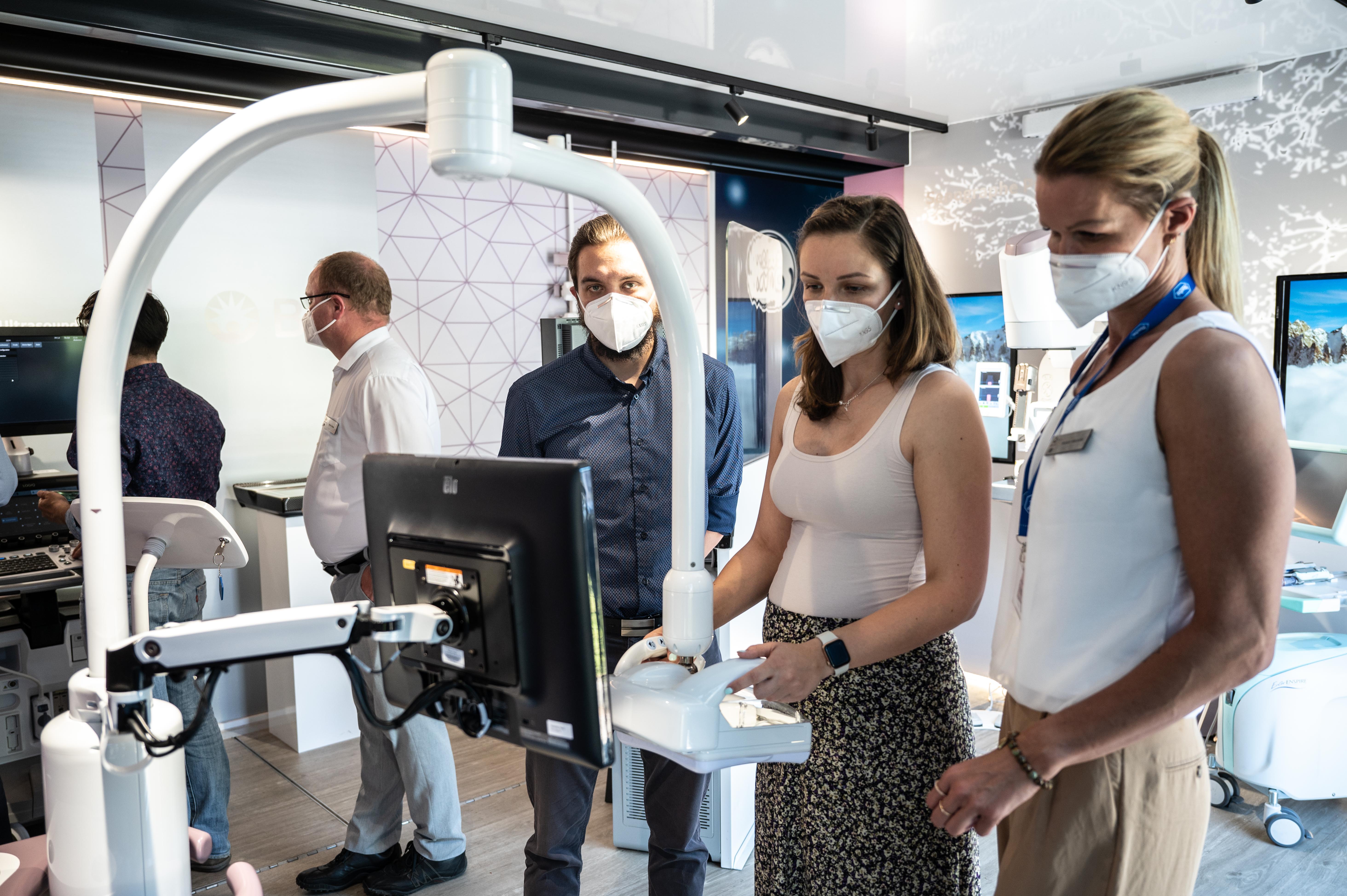Healthcare Roadshow Highlights Innovation, Screening Awareness

Endre Ascsillán
GE Healthcare has launched a roadshow across Europe filled with innovations to raise awareness of the importance of timely medical screenings. The aim is to catch diseases early enough for proper treatment to start, increasing the chances of survival, especially in serious cases such as cancer.
The truck is equipped with the latest medical imaging innovations by GE Healthcare, to which its Hungarian hub has contributed significantly. With the WHXR Roadshow 2021 touring 16 countries in 29 weeks, the Budapest Business Journal talks to Endre Ascsillán, vice president at GE Global, CEE, based in Hungary.
“We are proud that Hungary has been the first stop of this spectacular tour in the region. Medical professionals have had the opportunity to see the truck live first in Siófok, later in Debrecen,” Ascsillán says.
One of the consequences of the disruptions caused by the coronavirus are people whose health may be compromised not directly by the disease but by the lack of attention as health care institutions are overwhelmed. Regular and timely screening exams are crucial to diagnosing diseases early, when the chances for a successful treatment are greatest.
“Delaying recommended cancer screenings may result in missed early-stage cancers that are not caught until they are already more advanced and potentially more difficult to treat. That impacts both the chances of recovery and the cost of the treatment,” Ascsillán says.
With medical staff across Europe working flat out to prioritize coronavirus patients, many tests have been missed or delayed, potentially jeopardizing the health of people whose diseases may have gone unnoticed.
In women’s health, for example, breast cancer is the most common neoplasia (an abnormal and excessive growth). It affects approximately one out of nine women. Mammography screenings dropped significantly during the pandemic, although an early diagnosis could be the most critical part of effective treatment, decreasing the risk of dying considerably.
Machine Learning
“Our latest digital innovations in medical imaging enable patients to get the answers they need about their health as quickly as possible, while our use of artificial intelligence (AI) brings the power of algorithms and machine learning to imaging,” Ascsillán explains.
He adds that GE Healthcare’s digital teams in Hungary play a significant role in developing innovative diagnostic solutions for the firm’s global customers.
Beyond the difficulties the pandemic has created, opportunities have also started growing. “In general, we can say that COVID-19 has accelerated the pace of technological change that has never been so dynamic and pointed out several new directions for development. It has also revealed the shortcomings of healthcare systems, how healthcare providers face challenges delivering high-quality care while managing greater capacity and workflow issues,” the vice president says.
This has triggered demand for adaptable and digitalized healthcare systems that empower clinicians with next-generation tools.
“Building on our innovation capabilities, available intelligent devices, access to data analytics, applications and services that are supported by the Edison platform, GE enables healthcare professionals to make faster, more informed decisions,” the vice president says.
GE Healthcare’s data science team in Budapest and Szeged have recently developed two revolutionary AI algorithms for X-ray machines. The first, which is FDA-approved, is embedded on-device and helps radiologists prioritize live-threatening, critical cases with a suspected collapsed lung.
The second, which works with GE’s Critical Care Suite 2.0, helps clinicians assess Endotracheal Tube (ETT) placement for intubated patients (in the case of patients on a ventilator, for example), including critical COVID-19 patients.
Predictive Analytics
Elsewhere, new predictive analytics software solutions are being developed for global markets in Hungary that will provide more efficient support for the capacity planning of healthcare professionals and the optimal use of equipment, reducing waiting lists and helping to save on costs.
“AI is at the heart of GE’s strategy, and we are proud to have GE Healthcare’s biggest European Data Science team in Hungary, working on several international products and research developments,” Ascsillán says.
“Our excellent academic and clinical partners in Hungary, as well as across Europe and in the United States, are actively involved in our projects, validation, and testing processes. This extraordinary cooperation provides our multidisciplinary teams with broad access to data and clinical expertise, enabling the teams to develop revolutionary healthcare products and services in Hungary for global markets,” he adds.
GE’s development of AI has made strides in Hungary. The healthcare division’s Thoracic Care Suite algorithm was the first in Europe to be used in a university environment in Budapest. The solution can detect eight abnormal chest radiograph findings that also support tuberculosis detection and can help spot pneumonia, indicative of COVID-19.
This suite of AI algorithms automatically analyses chest X-ray images for the presence of abnormal radiologic findings and flags these immediately, including some that are not visible to a radiologist.
“Our vision for the future of healthcare is precision health; where we use the latest technologies like AI and Additive, with data from across our portfolio to create insights for better, more targeted, more individualized patient care,” Ascsillán explains.
“At GE, we believe that AI can be the new ‘superpower’ for medical professionals as healthcare delivery and related administration become more complex. It can lead to more accurate and faster diagnoses and can free up the time of healthcare professionals to deliver better patient care,” the GE vice president concludes.

GE Healthcare has a digital center in Budapest and Szeged (175 km southeast of the capital by road) and a Regional Repair Center in Páty (20 km west of Budapest) employing a staff of 700-plus. More than 400 of those are high-skilled software engineers in R&D positions who work in medical imaging, workflow management, and artificial intelligence deployment. GE Healthcare Magyaroszág Kft. generated HUF 40 bln in revenue in 2020, an increase on the previous year. A total of five R&D innovation projects were certified during the last year, which will be continued in 2021 via an R&D investment of HUF 3 bln.
This article was first published in the Budapest Business Journal print issue of July 16, 2021.
SUPPORT THE BUDAPEST BUSINESS JOURNAL
Producing journalism that is worthy of the name is a costly business. For 27 years, the publishers, editors and reporters of the Budapest Business Journal have striven to bring you business news that works, information that you can trust, that is factual, accurate and presented without fear or favor.
Newspaper organizations across the globe have struggled to find a business model that allows them to continue to excel, without compromising their ability to perform. Most recently, some have experimented with the idea of involving their most important stakeholders, their readers.
We would like to offer that same opportunity to our readers. We would like to invite you to help us deliver the quality business journalism you require. Hit our Support the BBJ button and you can choose the how much and how often you send us your contributions.








